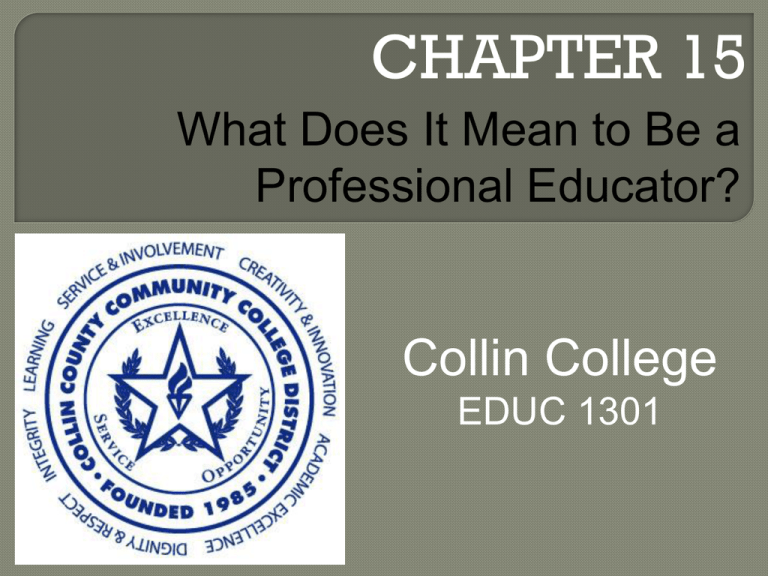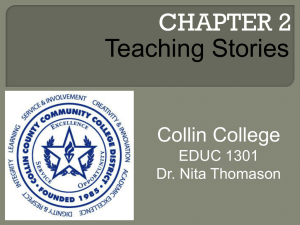
CHAPTER 15
What Does It Mean to Be a
Professional Educator?
Collin College
EDUC 1301
Chapter 15 – What Does It Mean to
a Professional
I.
A.
B.
C.
Profession or not?
Being a professional
Professional development
Copyright by Houghton Mifflin Company. All rights
reserved.
15
-2
A Profession:
Offers a unique service to society
Relies on intellectual skills for performance of
its service
Has a long period of specialized training
Offers individuals and the professional group
autonomy and decision making authority
Requires members to accept personal
responsibility for actions and decisions
Is self-governing; has a code of ethics
Copyright by Houghton Mifflin Company. All rights
reserved.
15
-3
Divide
into Groups of 3
Consider the Question
Review the Six Characteristics of a
Profession
Explain how each relates to teaching
Decide as a group YES or NO and defend
your answer to the class
Copyright by Houghton Mifflin Company. All rights
reserved.
15
-4
Children
have many teachers (parents, media)
Limited training period – Bachelor’s degree
and lack of competition for entry
Constraints on Autonomy (Curriculum,
working conditions, clients required)
Little personal accountability for failure or
malpractice; little involvement in professional
organizations
Low-paying & high-job security
Copyright by Houghton Mifflin Company. All rights
reserved.
15
-5
Teachers’ Commitment
to Service
The Teacher’s Unique Skills
Domain of Control – Autonomy in classroom
Copyright by Houghton Mifflin Company. All rights
reserved.
15
-6
Level
One
Imitative“Going through the
Maintenance motions”
Level
Two
Level
Three
Meditative
GenerativeCreative
Reflects, but within a
limited range
Takes wide view of
knowledge, creates
desire to learn
Copyright by Houghton Mifflin Company. All rights reserved.
15 - 7
Standard I. The teacher designs instruction appropriate for all
students that reflects an understanding of relevant content and is
based on continuous and appropriate assessment.
Standard II. The teacher creates a classroom environment of
respect and rapport that fosters a positive climate for learning,
equity, and excellence.
Standard III. The teacher promotes student learning by providing
responsive instruction that makes use of effective communication
techniques, instructional strategies that actively engage students in
the learning process, and timely, high-quality feedback.
Standard IV. The teacher fulfills professional roles and
responsibilities and adheres to legal and ethical requirements of the
profession.
http://www.sbec.state.tx.us/SBECOnline/standtest/standards/allppr.pdf
Copyright by Houghton Mifflin Company. All rights
reserved.
15
-8
Teachers:
1. Know the subjects they teach and how to
teach these subjects to students.
2. Are committed to their students and their
learning.
3. Are responsible for managing and
monitoring learning.
4. Think systematically about their practice
and learn from experience.
5. Are members of a learning community.
Copyright by Houghton Mifflin Company. All rights
reserved.
15
-9
NEA
2.7 million members
Geographically diverse
membership
Offers a wide range of
services
Endorses candidates
and positions that favor
education
• Money & size increase
AFT
About .9 million
members
Members in key urban
areas
Known for aggressive
labor-relations tactics
Champions reform
efforts that benefit
education and teachers
influence
Copyright by Houghton Mifflin Company. All rights
reserved.
15
-
National
Association for the Education of
Young Children | NAEYC
Copyright by Houghton Mifflin Company. All rights
reserved.
15
-
Includes
all members of school community
Focus on continuous improvement
•
Individual, collegial, organizational
Respects
& nurtures intellectual capacity
Emphasizes best practices
•
Content, technology, teaching strategies, etc.
Planned
•
•
Collaboratively
Coherent long-term plan
Evaluated
on basis of student learning
Copyright by Houghton Mifflin Company. All rights
reserved.
15
-
Independent
Study
• Action research
Group
Study
Graduate Study
Professional Development Programs
Supervision
Mentoring
Systematic Reflection on Practice
150 hours required each 5 year cycle
Copyright by Houghton Mifflin Company. All rights
reserved.
15
-
HOMEWORK
Lesson Plans Due
•Field-Based Reflections Due (Blackboard)
ITEMS DUE May 5
• Portfolio Due
Copyright by Houghton Mifflin Company. All rights
reserved.
12
-


